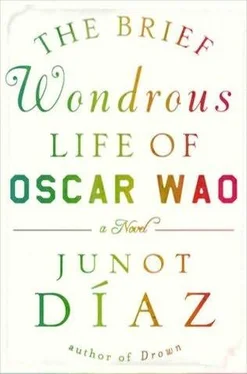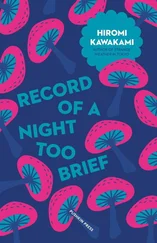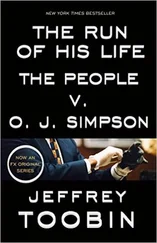Dios mío .
They parked the car on the edge of the road and marched her into the cane. They walked until the cane was roaring so loud around them it sounded as if they were in the middle of a storm. Our girl, she kept flinging her head to get her hair out of her face, could think only about her poor little boy, and that was the sole reason she started to weep.
The large grunt handed his partner a nightstick.
Let’s hurry up.
No, Beli said.
How she survived I’ll never know. They beat her like she was a slave. Like she was a dog. Let me pass over the actual violence and report instead on the damage inflicted: her clavicle, chicken-boned; her right humerus, a triple fracture (she would never again have much strength in that arm); five ribs, broken; left kidney, bruised; liver, bruised; right lung, collapsed; front teeth, blown out. About 167 points of damage in total and it was only sheer accident that these motherfuckers didn’t eggshell her cranium, though her head did swell to elephant-man proportions. Was there time for a rape or two? I suspect there was, but we shall never know because it’s not something she talked about. All that can be said is that it was the end of language, the end of hope. It was the sort of beating that breaks people, breaks them utterly.
Throughout most of the car ride, and even into the first stanzas of that wilding, she maintained the fool’s hope that her Gangster would save her, would appear out of the darkness with a gun and a reprieve. And when it became clear that no rescue was forthcoming, she fantasized, in the instance of a blackout, that he would visit her at the hospital and there they would be married, he in a suit, she in a body cast, but then that too was revealed to be plepla by the sickening crack of her humerus, and now all that remained was the agony and the foolishness. In a blackout she caught sight of him disappearing on that motorcycle again, felt the tightness in her chest as she screamed for him to wait, wait. Saw for a brief instant La Inca praying in her room—the silence that lay between them now, stronger than love—and in the gloaming of her dwindling strength there yawned a loneliness so total it was beyond death, a loneliness that obliterated all memory, the loneliness of a childhood where she’d not even had her own name. And it was into that loneliness that she was sliding, and it was here that she would dwell forever, alone, black, fea, scratching at the dust with a stick, pretending that the scribble was letters, words, names.
All hope was gone, but then, True believers, like the Hand of the Ancestors themselves, a miracle. Just as our girl was set to disappear across that event horizon, just as the cold of obliteration was stealing up her legs, she found in herself one last reservoir of strength: her Cabral magis—and all she had to do was realize that once again she’d been tricked, once again she’d been played , by the Gangster, by Santo Domingo, by her own dumb needs, to ignite it. Like Superman in Dark Knight Returns , who drained from an entire jungle the photonic energy he needed to survive Coldbringer, so did our Beli resolve out of her anger her own survival. In other words, her coraje saved her life.
Like a white light in her. Like a sun. She came to in the ferocious moonlight. A broken girl, atop broken stalks of cane. Pain everywhere but alive. Alive.
And now we arrive at the strangest part of our tale. Whether what follows was a figment of Beli’s wracked imagination or something else altogether I cannot say. Even your Watcher has his silences, his páginas en blanco. Beyond the Source Wall few have ventured. But no matter what the truth, remember: Dominicans are Caribbean and therefore have an extraordinary tolerance for extreme phenomena. How else could we have survived what we have survived? So as Beli was flitting in and out of life, there appeared at her side a creature that would have been an amiable mongoose if not for its golden lion eyes and the absolute black of its pelt. This one was quite large for its species and placed its intelligent little paws on her chest and stared down at her.
You have to rise .
My baby, Beli wept. Mi hijo precioso.
Hypatia, your baby is dead .
No, no, no, no, no. It pulled at her unbroken arm. You have to rise now or you’ll never have the son or the daughter .
What son? she wailed. What daughter?
The ones who await .
It was dark and her legs trembled beneath her like smoke.
You have to follow .
It rivered into the cane, and Beli, blinking tears, realized she had no idea which way was out. As some of you know, cane-fields are no fucking joke, and even the cleverest of adults can get mazed in their endlessness, only to reappear months later as a cameo of bones. But before Beli lost hope she heard the creature’s voice. She (for it had a woman’s lilt) was singing! In an accent she could not place: maybe Venezuelan, maybe Colombian. Sueño, sueño, sueño, como tú te llamas . She clung unsteadily to the cane, like an anciano clinging to a hammock, and, panting, took her first step, a long dizzy spell, beating back a blackout, and then her next. Precarious progress, because if she fell she knew she would never stand again. Sometimes she saw the creature’s chabine eyes flashing through the stalks. Yo me llamo sueño de la madrugada . The cane didn’t want her to leave, of course; it slashed at her palms, jabbed into her flank and clawed her thighs, and its sweet stench clogged her throat.
Each time she thought she would fall she concentrated on the faces of her promised future—her promised children—and from that obtained the strength she needed to continue. She pulled from strength, from hope, from hate, from her invincible heart, each a different piston driving her forward. Finally, when all were exhausted, when she began to stumble headfirst, heading down like a boxer on his last legs, she stretched her uninjured arm out and what greeted her was not cane but the open world of life. She felt the tarmac under her bare broken feet, and the wind. The wind! But she had only a second to savor it, for just then an unelectrified truck burst out of the darkness in a roar of gears. What a life, she mused, all that lucha only to be run over like a dog. But she wasn’t flattened. The driver, who later swore he saw something lion-like in the gloom, with eyes like terrible amber lamps, slammed on the brakes and halted inches from where a naked blood-spattered Beli tottered.
Now check it: the truck held a perico ripiao conjunto, fresh from playing a wedding in Ocoa. Took all the courage they had not to pop the truck in reverse and peel out of there. Cries of, It’s a baká, a ciguapa, no, a haitiano! silenced by the lead singer, who shouted, It’s a girl! The band members lay Beli among their instruments, swaddled her with their chacabanas, and washed her face with the water they carried for the radiator and for cutting down the klerín. Down the band peered, rubbing their lips and running nervous hands through thinning hair.
What do you think happened?
I think she was attacked.
By a lion, offered the driver.
Maybe she fell out of a car.
It looks like she fell under a car.
Trujillo , she whispered.
Aghast, the band looked at one another.
We should leave her.
The guitarrista agreed. She must be a subversive. If they find her with us the police will kill us too. Put her back on the road, begged the driver. Let the lion finish her.
Silence, and then the lead singer lit a match and held it in the air and in that splinter of light was revealed a blunt-featured woman with the golden eyes of a chabine. We’re not leaving her, the lead singer said in a curious cibaeña accent, and only then did Beli understand that she was saved.↓
Читать дальше







![О Генри - Недолгий триумф Тильди [The Brief Debut of Tildy]](/books/415353/o-genri-nedolgij-triumf-tildi-the-brief-debut-of-thumb.webp)




